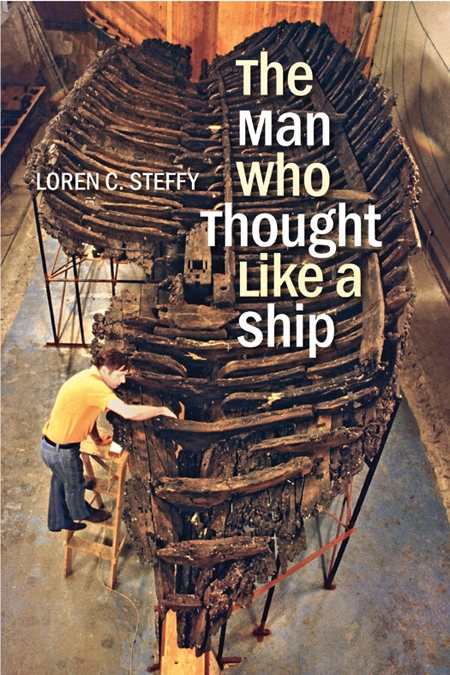The Man Who Thought Like a Ship
The life of J. Richard Steffy (“Dick” to his friends) centered on ships and shipbuilding. Though he spent most of his working life as an electrician, his childhood fascination with ships and the history of their construction remained throughout his life. Steffy’s self-taught knowledge of naval architecture and finely honed model-building skills led to the first reconstruction of an ancient ship hull using the actual naturally preserved timbers.
Found in 1965 in waters off of Cyprus, the remains of a Greek merchantman wreck over two millenia old provided the beginning of the new science of nautical archaeology. For an electrician from a small Pennsylvania town, Steffy’s success with the Kyrenia Ship (as it’s known now) came from the proverbial left field—yet more evidence that scientific puzzles can be solved by unlikely minds. As Loren Steffy shows in this recounting of his father’s life and achievements, what gave Dick Steffy the keys to unlocking ancient shipbuilders’ secrets were his finely tuned intellect and his lifelong passion for ships.
A writer’s choice to focus a book on a small area of scientific research with which few outside the sphere of shipbuilders and archaeologists are familiar is no small task. Writing a biography about a working man and a trailblazer in nautical archaeology who was also his father must have caused Loren Steffy some lost sleep. How does a son tell his father’s story without falling off the figurative fence between sentimentality and dry reportage? Such a son would be well served by using The Man Who Thought Like a Ship as a template. Steffy’s experience as a journalist gives him a ready platform on which to construct his narrative. The particulars of Dick Steffy’s life take care of the rest, along with the younger Steffy’s singular perspective as a biographer.
Above all that, though, is the range of emotions subtly evoked in Loren Steffy’s word choice and the overall construction of the narrative. There’s a definite but unobtrusive ribbon of warmth, humor, admiration, and love threaded through the facts of Dick Steffy’s life that doesn’t hide his lesser qualities shared by all humans. Loren Steffy’s prose effortlessly builds his father’s story in the reader’s mind, using just enough nautical terms (and a handy glossary) for general readers to understand the obstacles Dick Steffy had to overcome to achieve his dream.
For any reader who enjoys biographies or books about scientific endeavors that aren’t sleep-inducing, The Man Who Thought Like a Ship is a perfect fit.
Reviewed by
J. G. Stinson
Disclosure: This article is not an endorsement, but a review. The publisher of this book provided free copies of the book to have their book reviewed by a professional reviewer. No fee was paid by the publisher for this review. Foreword Reviews only recommends books that we love. Foreword Magazine, Inc. is disclosing this in accordance with the Federal Trade Commission’s 16 CFR, Part 255.

